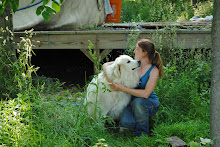Last night, I watched a movie all about dirt. The documentary was, in fact, entitled "Dirt!" (the exclamation point conveyed by the somewhat manic animation sequences depicting the microscopic life of dirt), and it did an admirable job of describing a conventionally unglamorous substance as worthy of awe and admiration. I came out of the screening with the same buoyant, yearning heart that Coca-cola commercials instilled in me as a child--I wanted to sink my hands into soil, to nurture seedlings, to walk barefoot on freshly turned earth. Which, by the way, is not a good way to preserve soil tilth, but which nevertheless is fiendishly tempting.
I came out into the snow and felt the first pangs of the winter farmer doldrums. Thus far, long- anticipated rest and other seasonal distractions have kept me from missing the dirt. Besides, I've been more than sufficiently busy, between planning next season, visiting family, and (lately) substitute teaching sixth grade math. But the numbers finally got to me. I'm tired of Excel spreadsheets, converting yield per foot into pounds of seed per acre. I'm overwhelmed by seed catalogues and their relentlessly positive descriptions. I'd like some more kale to accompany my veal and potatoes. Watching "Dirt!", I felt envy rise in my chest at the muscles and tan lines of farmers. I'm winded by a romp in the snow, and I haven't lifted anything heavier than a cast iron skillet in months.
I have a plan, however. As soon as I am unemployed again (but before the financial ramification of this state have fully sunk in), I'm buying some dirt. Potting soil, some trays, a few more sprouting jar lids. I'm going to fire up the grow lights that Andrew's grandmother donated to the cause, and I'm going to grow. I'll start my onions, certainly, but I think I'll throw some greens into the mix as well. Maybe a kumquat tree for the corner? Or perhaps I could convert the defunct front porch to our cottage into a very cold cold frame?
Then again, I might feel completely satisfied simply to sit on the kitchen floor with a handful of finished compost, entranced by the sweet promise of fecundity.
I came out into the snow and felt the first pangs of the winter farmer doldrums. Thus far, long- anticipated rest and other seasonal distractions have kept me from missing the dirt. Besides, I've been more than sufficiently busy, between planning next season, visiting family, and (lately) substitute teaching sixth grade math. But the numbers finally got to me. I'm tired of Excel spreadsheets, converting yield per foot into pounds of seed per acre. I'm overwhelmed by seed catalogues and their relentlessly positive descriptions. I'd like some more kale to accompany my veal and potatoes. Watching "Dirt!", I felt envy rise in my chest at the muscles and tan lines of farmers. I'm winded by a romp in the snow, and I haven't lifted anything heavier than a cast iron skillet in months.
I have a plan, however. As soon as I am unemployed again (but before the financial ramification of this state have fully sunk in), I'm buying some dirt. Potting soil, some trays, a few more sprouting jar lids. I'm going to fire up the grow lights that Andrew's grandmother donated to the cause, and I'm going to grow. I'll start my onions, certainly, but I think I'll throw some greens into the mix as well. Maybe a kumquat tree for the corner? Or perhaps I could convert the defunct front porch to our cottage into a very cold cold frame?
Then again, I might feel completely satisfied simply to sit on the kitchen floor with a handful of finished compost, entranced by the sweet promise of fecundity.






